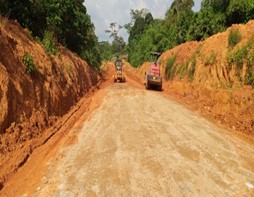Golden Veroleum Liberia (GVL), a palm oil company operating in Sinoe and Grand Kru counties, has initiated a significant road rehabilitation project in southeastern Liberia. This initiative stems from the severe logistical challenges the company faced during the previous rainy season, where extensive road damage led to substantial financial losses. The dilapidated roads hindered fuel supply, inflated transportation costs, and ultimately hampered GVL’s operational efficiency. Recognizing the critical need for improved infrastructure, GVL has committed to repairing key roads connecting its farms, mill, and bulking facilities. This proactive approach aims to mitigate future losses and enhance the company’s overall productivity. Furthermore, the improved roads are expected to significantly benefit local communities by facilitating easier movement of people and goods, particularly during the challenging rainy season.
The road rehabilitation project underscores GVL’s commitment to sustainable development within its operational areas. Beyond its immediate economic benefits to the company, the initiative carries significant implications for the socio-economic well-being of communities in Sinoe, Grand Kru, and Maryland counties. The improved road network will not only facilitate trade and commerce but also enhance access to essential services such as healthcare and education. This commitment to infrastructural development aligns with GVL’s broader corporate social responsibility strategy, which emphasizes improving the livelihoods of its host communities and employees. By investing in these crucial infrastructure improvements, GVL aims to foster a mutually beneficial relationship with the communities in which it operates, contributing to their long-term development and prosperity.
The rainy season in southeastern Liberia poses a recurring challenge to transportation, impacting businesses and communities alike. The heavy downpours often render roads impassable, isolating communities and disrupting essential services. GVL’s experience last year exemplifies the debilitating effects of poor road conditions on businesses, particularly those involved in agriculture and resource extraction. The company’s inability to efficiently transport goods due to damaged roads resulted in substantial financial losses. This underscores the urgent need for robust and resilient infrastructure capable of withstanding the harsh weather conditions prevalent in the region. GVL’s road rehabilitation efforts are therefore not only critical for the company’s operations but also represent a significant contribution to regional development.
GVL’s investment in road infrastructure demonstrates a recognition of the interconnectedness between business success and community well-being. By improving road connectivity, the company is not only enhancing its own operational efficiency but also creating positive ripple effects throughout the region. Improved roads will facilitate trade and commerce, create new economic opportunities, and enhance access to essential services for local communities. This approach exemplifies a sustainable business model that integrates economic development with social responsibility. GVL’s proactive approach to addressing the infrastructure challenges in southeastern Liberia sets a positive precedent for other businesses operating in the region, highlighting the importance of investing in community development as a pathway to long-term sustainability.
The road rehabilitation project signifies a long-term commitment by GVL to improving infrastructure in its operational areas. The company’s previous efforts to maintain roads proved insufficient to withstand the heavy rains, demonstrating the need for a more robust and sustainable solution. The current rehabilitation efforts are designed to address these shortcomings and create a more resilient road network capable of withstanding future rainy seasons. This commitment to long-term investment in infrastructure reflects GVL’s understanding that sustainable business operations require a solid foundation of supporting infrastructure. By addressing the root causes of the transportation challenges in the region, GVL is contributing to a more stable and prosperous future for both its business and the communities it serves.
In conclusion, GVL’s road rehabilitation project in southeastern Liberia represents a significant investment in both the company’s future and the well-being of its host communities. By addressing the critical infrastructure challenges posed by the rainy season, GVL is not only mitigating its own operational risks but also contributing to the socio-economic development of the region. The improved roads will facilitate trade, enhance access to essential services, and create new economic opportunities for local communities. This initiative underscores GVL’s commitment to sustainable development and its recognition of the crucial link between business success and community prosperity. The project serves as a positive example of corporate social responsibility and demonstrates the potential for businesses to play a transformative role in developing regions facing infrastructural challenges.














